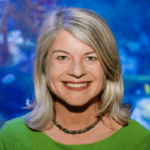Launched in spring 2020, the Climate Champions pilot project, based at the University of California, San Diego, models K–12, university, and community collaboration for climate action and climate justice. It was inspired and informed by the Environmental and Climate Change Literacy Project and Summit (ECCLPS) and its report that the University of California (UC), California State University (CSU), Ten Strands, and key stakeholders produced in 2019. Through thought partnership with Ten Strands and other key stakeholders, Climate Champions advances environmental and climate change literacy for K–12 students by leveraging state university systems to support curriculum development and learning for pre-service and in-service teachers. In the story below, Nan Renner, Senior Director of Learning Design and Innovation at UC San Diego’s Birch Aquarium at Scripps Institution of Oceanography and CREATE STEM Success Initiative, outlines Climate Champions’ action plan and the objectives for the curriculum’s development that were showcased at the May 22, 2021, summit and in this story: Climate Champions: Collaborative Learning for Climate Action.
Collaborating with climate educators creates a powerful counterbalance to our worries about a warming planet, widespread environmental racism, inadequate response by elected officials, and a future without precedent. Learning together—with young people and adults—we prepare for collective action. Focusing locally, we feel empowered. Connecting with people and strengthening community, we build personal and collective resilience. As educators wrestling with a challenging topic, we find strength in embracing the fullness of humanity, with diverse perspectives, multiple disciplines, breadth and depth of knowledge and emotion. Even in the midst of busy lives and a global pandemic, taking on this work brings meaningful rewards.
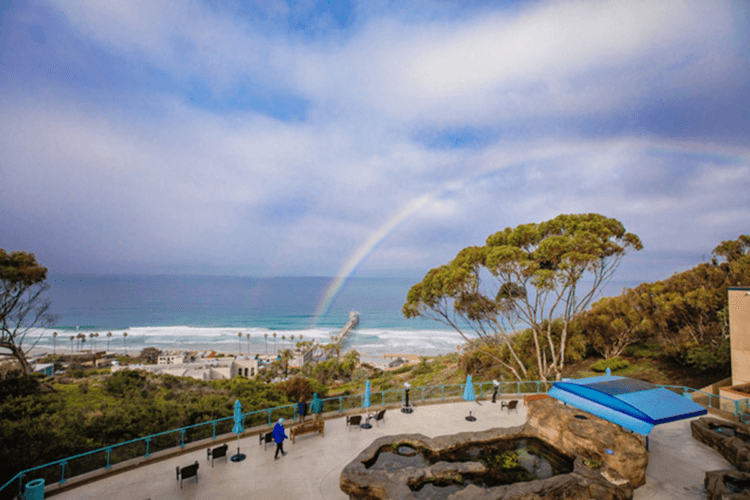
Climate Champions Collaborate on Curriculum
With a commitment to deep collaboration and funding from the UC San Diego Social Sciences Climate Action Lab, Climate Champions started in summer 2020 with the goal to get more teaching, learning, and action on the climate crisis in local schools. The Climate Champions Virtual Summit on May 22, 2021, culminated a year of collaborative effort (all on Zoom!) and marked the achievement of multiple goals.
Young people, teachers, community educators, and scholars shared action-oriented ideas and resources about climate challenges and opportunities, Indigenous knowledge and climate change, climate communication strategies, climate justice and action, and classroom-ready curriculum and learning resources. Recordings of the summit sessions are archived on our website.
Summit participants felt motivated, energized, and inspired. Their comments help tell the story:
“The youth advocates made a strong impact on the way I see my role as an educator in bringing up this topic in the classroom. Advocacy matters!” ~Elementary School Teacher
“What was most meaningful for me was hearing Indigenous voices… I greatly appreciated the opportunity to learn from their perspectives firsthand.” ~High School Student
“Teaching climate through a social/interdisciplinary lens has made me want to figure out how to both improve my own teaching and how to expand climate education beyond the traditional science spaces… I appreciated how this event brought together people working in different aspects of climate education and activism, from higher ed to K–12 to activist orgs and informal learning spaces. I loved the format of brief presentations with less structured discussion time because it allowed for everyone to participate more actively while also building/deepening relationships, which is crucial in any kind of transformative work!” ~University Educator
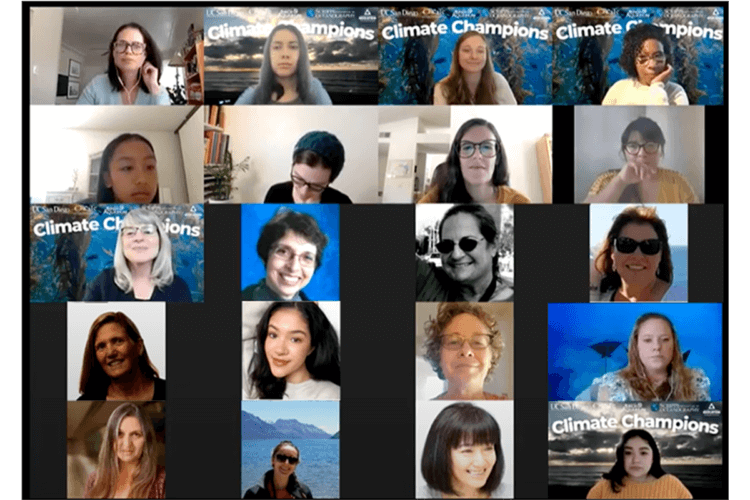
The Climate Champions Virtual Summit format embodied our convivial commitments. Zoom sessions provided a platform for generous sharing of knowledge from diverse perspectives. Opt-in breakout rooms offered opportunities to connect with community organizations. In the main Zoom room, curated music and slides with artwork invited participants to take a break but still feel connected. Raffle prizes combined seriousness and fun, with books about climate and justice, aquarium tickets, and gift certificates for a plant nursery and vegetarian restaurants. The formal program concluded with a recorded performance of EarthRise by U.S. Youth Poet Laureate Amanda Gorman. More music followed and stalwart Climate Champions danced to the tunes on Zoom.
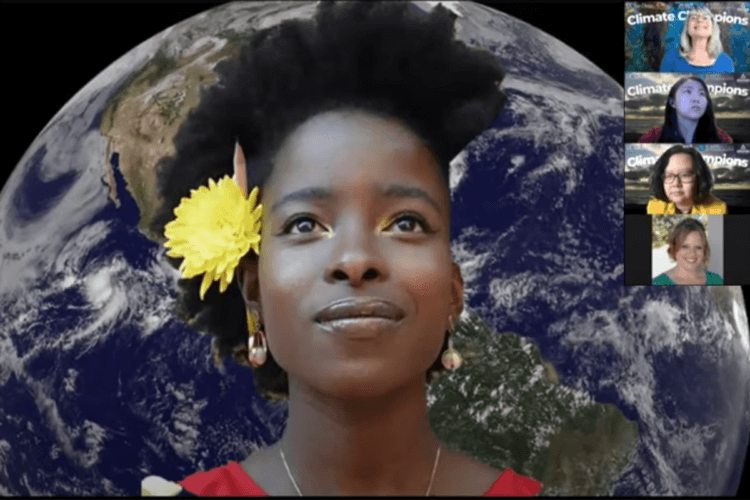
Expanding Local Solutions for Global Crisis
Learning from this first year, we are planning next steps, aligned with recommendations from ECCLPS. Working with local in-service and pre-service teachers, we will continue field-testing and improving our climate curriculum. While we strive for scientific understanding of causes, effects, and solutions, we also work toward smart and creative multidisciplinary integration. Youth leaders will co-create and share locally focused climate-action projects. Birch Aquarium at Scripps will expand climate programs. We will host more events—online and in person, welcoming and inclusive—to promote professional learning, curriculum adoption, and community building. We will evaluate our efforts and focus on educational efficacy and the needs of students and teachers.
While the grassroots climate movement is growing in all sectors, Climate Champions invests in K–12 and community education. Students, parents, and teachers want schools to address the climate crisis and model how we can collectively reduce emissions and reap the benefits of a less polluted environment. Climate-action projects can focus student learning on the most pressing issue of our time. And, teachers and students are powerful influencers for social change. Young people understand the need to act, and we must take action too. In a time when we have lost so much, we choose to focus on all we can save, finding inspiration and wisdom to do this important work that needs to be done.
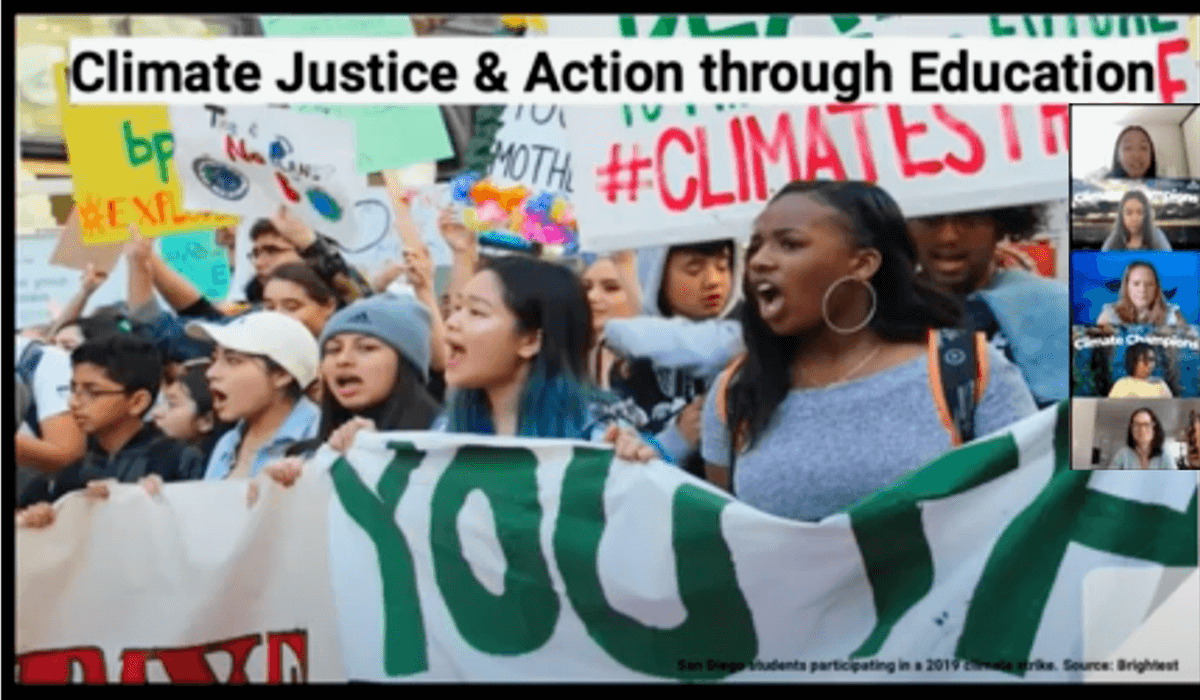
_________________________________
Climate Champions involves collaborators from across the UC San Diego campus: CREATE (Center for Research on Educational Equity, Assessment, and Teaching Excellence), Birch Aquarium at Scripps, Scripps Institution of Oceanography, and the Education Studies Department. We enjoy funding and support from the Social Sciences Division Climate Action Lab, and we work in tandem with the San Diego County Office of Education. For more information on Climate Champions, contact Nan Renner (nrenner@ucsd.edu).

